Travel and Migration in the Middle Ages – Gregynog Medieval Staff-Student Colloquium
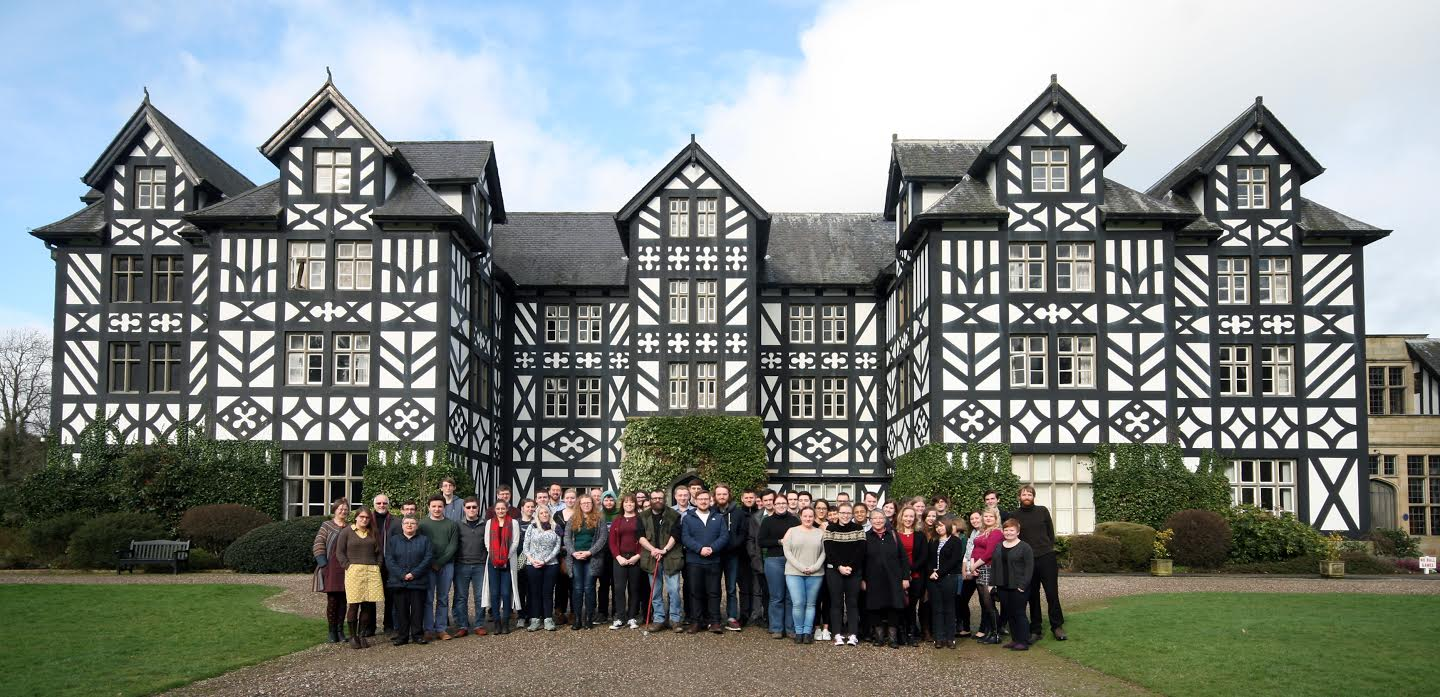
This week’s blog was written by Dr Harriet Webster, Lecturer in Medieval History at UWTSD Lampeter. This year’s Medieval Staff-Student Colloquium was held 27 February – 1 March 2017 on the theme of Travel and Migration in the Middle Ages.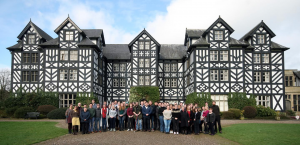
It’s that time of year again: staff and students from across Wales travelled to Gregynog Hall in mid-Wales for the annual Gregynog Medieval Staff-Student Colloquium. Delegates from Bangor, Aberystwyth, Swansea, Cardiff, and of course our own contingent from UWTSD Lampeter, braved the snow to arrive in time for afternoon tea on Monday of reading week.
 The theme of the conference this year was migration and travel in the Middle Ages, and for three paper-packed days we heard twelve different interpretations of the subject.
The theme of the conference this year was migration and travel in the Middle Ages, and for three paper-packed days we heard twelve different interpretations of the subject.
After reunions and introductions over tea and coffee, we were welcomed by this year’s organiser, Dr Rhun Emlyn of Aberystwyth University. The first paper was on the subject of ‘Crisis and the Movement of People in the Medieval English Countryside’, delivered by Phillipp Schofield (Aberystwyth) and demonstrated the impact of crises such as the Great Famine and Black Death on England’s population in the fourteenth century.
After dinner it was time for the guest lecture by Dr Bart Lambert from the University of York. He was one of the Research Assistants on York’s England’s Immigrants 1330-1550 (https://www.englandsimmigrants.com) project, and touched on many important issues from both the Middle Ages and the present day in his paper ‘Brexit in the Middle Ages? The Immigrant Presence in England, 1330-1550’.
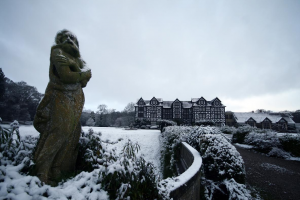 Waking up to snow-sprinkled grounds the following morning, our exploration of the theme continued with Dr Mark Hagger (Bangor) challenging the itinerant nature of power in the Anglo-Norman world with his paper on ‘Making Decisions on the Hoof? The Travels of, and Travel to, the Norman Court in the Reign of Henry I (1106-1135)’.
Waking up to snow-sprinkled grounds the following morning, our exploration of the theme continued with Dr Mark Hagger (Bangor) challenging the itinerant nature of power in the Anglo-Norman world with his paper on ‘Making Decisions on the Hoof? The Travels of, and Travel to, the Norman Court in the Reign of Henry I (1106-1135)’.
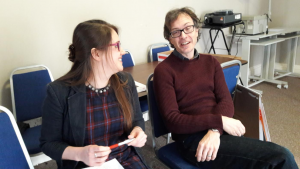 Having been persuaded that Henry centralised his government of the duchy of Normandy in Rouen rather than being constantly on the move, we travelled across the Channel to look at the Normans creating other forms of permanent institution in England. ANCHOR. Our very own Therron Welstead shared his doctoral research so far concerning Norman castles built on the site of Anglo-Saxon cemeteries in: ‘The Coming of the Normans: Power, Subjugation and Assimilation’.
Having been persuaded that Henry centralised his government of the duchy of Normandy in Rouen rather than being constantly on the move, we travelled across the Channel to look at the Normans creating other forms of permanent institution in England. ANCHOR. Our very own Therron Welstead shared his doctoral research so far concerning Norman castles built on the site of Anglo-Saxon cemeteries in: ‘The Coming of the Normans: Power, Subjugation and Assimilation’.
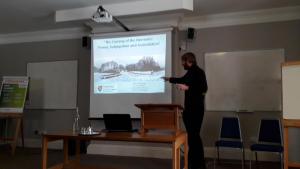 The second session of the morning involved another paper from one of our own. Following an intriguing comparison of the lives of two important monastic historians of the twelfth century in ‘Monastic Migration in the Anglo-Norman Realm: Orderic Vitalis and Symeon of Durham’ by Dr Charlie Rozier (Swansea), Professor Janet Burton continued the monastic theme with a paper on ‘Monks on the Move’. In this she showed that far from living a static, cloistered existence, movement and travel were central to the creation, expansion and success of the Cistercian Order as the General Chapter, visitation and appointment of abbots all relied on the movement of personnel from house to house.
The second session of the morning involved another paper from one of our own. Following an intriguing comparison of the lives of two important monastic historians of the twelfth century in ‘Monastic Migration in the Anglo-Norman Realm: Orderic Vitalis and Symeon of Durham’ by Dr Charlie Rozier (Swansea), Professor Janet Burton continued the monastic theme with a paper on ‘Monks on the Move’. In this she showed that far from living a static, cloistered existence, movement and travel were central to the creation, expansion and success of the Cistercian Order as the General Chapter, visitation and appointment of abbots all relied on the movement of personnel from house to house.
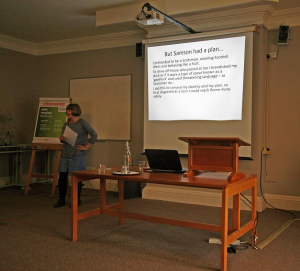 Lunch was followed by Dr Euryn Roberts (Bangor) exploring ‘Exile Experiences in Medieval Wales’, and a free afternoon in which we left the hall to explore local sites of interest. Some of us braved the sideways sleet to see what we could of the view from the ruins of Montgomery Castle, while those who were slightly more sensible visited the nearby church of Meifod.
Lunch was followed by Dr Euryn Roberts (Bangor) exploring ‘Exile Experiences in Medieval Wales’, and a free afternoon in which we left the hall to explore local sites of interest. Some of us braved the sideways sleet to see what we could of the view from the ruins of Montgomery Castle, while those who were slightly more sensible visited the nearby church of Meifod.
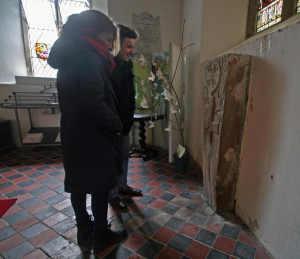 Afternoon tea had never been more welcome, and once warmed through, we returned to the seminar room for the first of our postgraduate sessions. We heard from Caitlin Naylor (Aberystwyth) first, and the idealised experiences of young Icelandic adventurers in ‘“There and back again”: Travel and Identity in the Islendingasogur’. This contrasted wonderfully with the second paper of the session by Rhiannon Sandy (Swansea) on the topic of ‘“He loved bet the taverne than the shoppe”: The Use of Indentures to Control Apprentices’ Behavior in Medieval England’, in which we learned a great deal about the actual experiences of young apprentices in London and Bridgewater – especially their drinking, gaming, and involvement with members of the opposite sex!
Afternoon tea had never been more welcome, and once warmed through, we returned to the seminar room for the first of our postgraduate sessions. We heard from Caitlin Naylor (Aberystwyth) first, and the idealised experiences of young Icelandic adventurers in ‘“There and back again”: Travel and Identity in the Islendingasogur’. This contrasted wonderfully with the second paper of the session by Rhiannon Sandy (Swansea) on the topic of ‘“He loved bet the taverne than the shoppe”: The Use of Indentures to Control Apprentices’ Behavior in Medieval England’, in which we learned a great deal about the actual experiences of young apprentices in London and Bridgewater – especially their drinking, gaming, and involvement with members of the opposite sex!
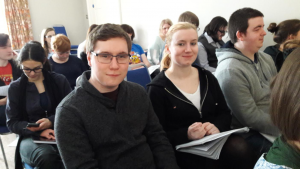 The last paper of the day came from Dr David Wyatt (Cardiff): ‘Forced Migration: Slavery and People Trafficking in Medieval Northern Europe’, which provoked interesting discussion about the importance of revisiting taboo topics in historiography.
The last paper of the day came from Dr David Wyatt (Cardiff): ‘Forced Migration: Slavery and People Trafficking in Medieval Northern Europe’, which provoked interesting discussion about the importance of revisiting taboo topics in historiography.
The snow having been replaced by glorious spring sunshine on the final day, the second postgraduate session of the colloquium opened with a paper from Timothy Jones (Cardiff) speaking on the topic of ‘Movement of People or Movement of Ideas? The Influence of Population Changes on Land Holding in the Eastern part of the See of Llandaff c.900-1300’. The student contributions to the conference were completed by Kiri Kolt (Aberystwyth) with whom we travelled back in time to examine ‘Legends of Migration: Creating a Mythical Homeland for the Hungarians in the Twelfth Century’.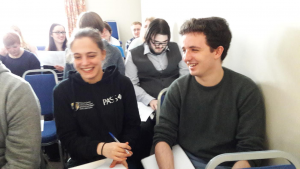
Dr Simon John (Swansea) provided the final paper of the colloquium, taking us on crusade in a fresh look at participants’ motives and the German contribution in ‘Going to Fight for God in Jerusalem: Godfrey of Bouillon and the Lotharingian Response to the First Crusade’.
Each evening before dinner, the students participating in the conference were given an opportunity to discuss in groups their reactions and responses to the day’s papers. In the final session of the conference they were invited to share their reflections on the conference theme with the other groups and staff. And that they said the debate was very stimulating and wide-ranging, considering issues such as identity, freedom of choice and motives for movement and travel in the Middle Ages. The students also commented on the number of papers which had demonstrated how to effectively challenge established historiographical paradigms, which I hope will help them when it comes to framing their own research questions in the future. 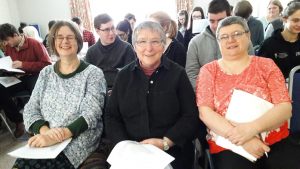
Students and staff alike agreed that it was an informative and above all enjoyable experience – one participant went as far as asking if we really needed to wait as long as twelve months before returning! While that, unfortunately, is not possible, everything is booked for next year, and this time it will be the turn of UWTSD to run the show. So if you might be interested, please put it in your diaries now – 26-28 February 2018. Undergrad or postgrad, all are welcome!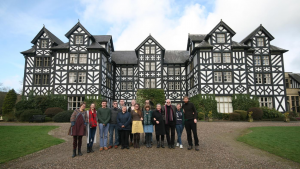
Leave a Reply